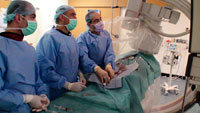
AUBMC has become the first medical institution in Lebanon and in the region to perform renal denervation for the treatment of hypertension. Renal denervation, involves inserting a catheter into each renal artery and performing controlled radiofrequency ablation to stop the effect of the sympathetic nervous system on the kidneys. This procedure, for the appropriate patient population can significantly reduce their blood pressure. Studies have shown that results can be seen within three to four weeks with an average drop in blood pressure of 30/12 mm Hg at six months, thus moving patients from uncontrolled to controlled blood pressure.
Dr. Ali Haydar, Assistant Professor of Clinical Diagnostic Radiology AUBMC stated that “not all patients are candidates for this procedure although the indications are expanding. Currently, people with uncontrolled blood pressure (systolic blood pressure more than 160 mm Hg) who are on three or more antihypertensive medications are potential candidates for renal denervation, provided they are investigated further at the Medical Center, to make sure they fulfill other inclusion criteria.”
One of the added benefits of the renal denervation procedure is the short recovery time and minimal scaring for the patient. Dr. Haydar stated that “After the procedure the patient can go home the following day. Since a small catheter is introduced at the top of the right leg, the wound will be miniscule.”
The entire procedure takes approximately sixty to 90 minutes and patients are slightly sedated, not under full anesthesia.